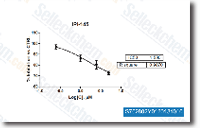and large MMP two amounts was linked with metastatic breast tumors. PDK1 modulated MMP two exercise in part by means of stabili zation towards proteasomal degradation, a mechanism just like that described for Akt1 and v akt. MMP two expression is linked to IGF I signaling and MT1 MMP, which activates the proenzyme form of MMP two, and is upregulated via the PI3K Akt1 pathway. These findings WZ4003 clinical trial are consistent with all the greater expression of MT1 MMP in Comma PDK1 cells because Akt is actually a down stream effector of PDK1, as well since the potential of LY294002 to block MMP two activation and inhibit Akt action. Our acquiring that PDK1 is activated inside a massive percentage of invasive human breast cancers even more suggests the impor tance of the PDK1 signaling pathway for the metastatic phenotype. Conclusion The current review demonstrates that PDK1 expression in mammary epithelial cells confers not merely a development benefit, but also an invasive phenotype characterized by improved MMP 2 activity and MT1 MMP expression.
These effects more define the tumorigenic and invasive processes elicited by PDK1, and propose a basic new part for that MasitinibAB1010 PDK1 pathway in breast cancer growth and metastasis. Background Gefitinib is surely an orally lively, epidermal growth element receptor tyrosine kinase inhibitor that inhibits EGFR signaling. Suitable 1 and 2 have been randomized Phase II trials in patients with non compact cell lung cancer refractory to platinum primarily based chemotherapy. These trials demonstrated that gefit inib was lively and frequently properly tolerated. How ever, ISEL. a Phase III trial evaluating the efficacy of gefitinib in contrast to ideal supportive care for refractory or recurrent NSCLC, failed to show a substantial survival benefit, except in an Eastern subpopulation and in individuals that had by no means smoked.
These data indicate that improved patient choice and blend tactics are most likely needed to maximize the benefits of applying this targeted treatment. Gefitinib exerts its antitumor activity by means of the inhibi tion of EGFR tyrosine kinase. however, this activity will not drastically correlate using the level of EGFR expres sion through the tumor  cell. Latest reviews have shown that you will discover variations involving gefitinib responders and non responders inside the frequency of activating mutations during the EGFR gene, which suggests that this kind of mutations is likely to be predictive markers for sensitivity to gefitinib. EGFR gene amplification, as detected by fluores cence in situ hybridization. was also reported to get a predictive marker. However, there are actually recognized to get gefitinib sensitive and intermediate sensitive tumors that have no activating mutations during the EGFR gene, such as gene amplification. Thus, it is actually most likely that other aspects in lung cancer cells may sensitize cells to gefitinib in addi tion to EGFR gene mutation and the amplification detected by FISH.
cell. Latest reviews have shown that you will discover variations involving gefitinib responders and non responders inside the frequency of activating mutations during the EGFR gene, which suggests that this kind of mutations is likely to be predictive markers for sensitivity to gefitinib. EGFR gene amplification, as detected by fluores cence in situ hybridization. was also reported to get a predictive marker. However, there are actually recognized to get gefitinib sensitive and intermediate sensitive tumors that have no activating mutations during the EGFR gene, such as gene amplification. Thus, it is actually most likely that other aspects in lung cancer cells may sensitize cells to gefitinib in addi tion to EGFR gene mutation and the amplification detected by FISH.
Peptides Cost
We strive to provide high quality peptides at a competitive price
